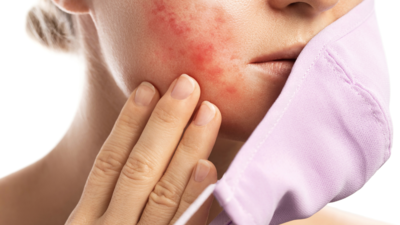ARTICLE AD BOX

Sudden Breakouts
Because of humidity, you produce more sweat and sebum which allows bacteria to multiply and clog your pores. For this reason, anyone can have acne breakouts, even if they usually do not have acne-prone skin.
Wash your face twice per day, picking a face wash that has salicylic acid, glycolic acid or benzoyl peroxide. They cleanse the skin, prevent clogged pores and control the growth of bacteria.Washing the face is needed, but scrubbing it too much can remove the skin’s barrier and make the face create even more oil.Ensure the skincare products you get say ‘non-comedogenic’ on them and stay oil free.Apply topical benzoyl peroxide or adapalene on blemishes to shrink redness and lower the time needed for healing.Pillowcases should be replaced regularly, hands shouldn’t come into contact with your face and phones should be routinely sanitized to lower the risk of bacteria
Fungal Infections
Abnormal growth of fungus is usually more common in the monsoon, especially in the forms of tinea corporis (ringworm), intertrigo (inflammation in folds of the skin) and candidiasis. Areas under the breasts, in the groin, under the arms and between the toes are best for fungal development because they stay warm and wet.
Don’t Forget Skin Dry: After you come out of the bath, immediately dry all the moist folds of your skin. Cool air from the hairdryer can help speed up drying areas that are more difficult.Talc-based antifungal powders (with clotrimazole or miconazole) can assist in drying out regions and can help impede the growth of fungus.Pick loose-fitting clothes made of cotton to let air in and help you stay sweat-free.Towels, razors and undergarments are best not shared because fungal infections can be spread that way.
Scalp Issues
In case of an active infection, twice a day use the antifungal cream as recommended by your doctor. A lot of skin fungi or cases that do not heal easily might call for oral antifungal medicine. Medication for eczema should not include over-the-counter steroid creams, since they can sort your symptoms in the short term, but may increase infection over time.During the monsoon, the oil production of the scalp may be excessive which can cause dandruff, itchiness and infections like seborrheic dermatitis.
Wet hair, little shampoo use and tying up wet hair can cause more issues for your scalp.Use a special anti-dandruff shampoo about 2–3 times per week. Ketoconazole, zinc pyrithione, selenium sulfide and salicylic acid are important ingredients for most dandruff products. They prevent the problems of flaking, itching and excessive fungus growth.While oiling the scalp lightly is fine, do not keep it on for too long in humid weather or it might cause follicle clogging and favor the growth of germs.After washing your hair, make sure everything is dry before start tying. A scalp that is damp with sweat can encourage both fungal and bacterial infections.Avoid using other people’s combs or hairbrushes. Clean your pillow covers and hair towels with hot water as part of your laundry.For patients who do not respond well to regular care, whose rash remains the same or continues to expand or those with worsening itching and flaking, consulting a dermatologist is a good next step. Proper evaluation and testing (like a KOH test for fungal infections) allows doctors to choose the best therapy.(Article courtesy: Dr. Stuti Khare Shukla, M.D. Dermatologist, Founder of Elements of Aesthetics, Hair Growth Queen of India, Founder of FDA-Approved Hair Growth Booster)
How to effectively ward off fungal infections during the monsoon season



.png)
.png)
.png)
















 5 days ago
5
5 days ago
5









 English (US) ·
English (US) ·